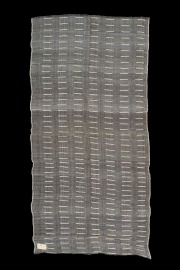Difference between revisions of "Weft insertion fabric"
Jump to navigation
Jump to search
m (Text replace - "== Authority ==" to "== Sources Checked for Data in Record ==") |
|||
| Line 1: | Line 1: | ||
| − | [[File:42.438-SC54343.jpg|thumb|]] | + | [[File:42.438-SC54343.jpg|thumb|Brocaded pina cloth<br>MFA# 42.438]] |
== Description == | == Description == | ||
A tricot knitted fabric made with an added filling yarn in the weft direction. Weft insertion fabric has been made since 1969. It is stronger and more snag resistant than regular knits. Weft insertion fabric is used for clothing, interfacing, and household items. | A tricot knitted fabric made with an added filling yarn in the weft direction. Weft insertion fabric has been made since 1969. It is stronger and more snag resistant than regular knits. Weft insertion fabric is used for clothing, interfacing, and household items. | ||
| − | == | + | ==Resources and Citations== |
* Rosalie Rosso King, ''Textile Identification, Conservation, and Preservation'', Noyes Publications, Park Ridge, NJ, 1985 | * Rosalie Rosso King, ''Textile Identification, Conservation, and Preservation'', Noyes Publications, Park Ridge, NJ, 1985 | ||
Latest revision as of 15:31, 26 June 2022
Description
A tricot knitted fabric made with an added filling yarn in the weft direction. Weft insertion fabric has been made since 1969. It is stronger and more snag resistant than regular knits. Weft insertion fabric is used for clothing, interfacing, and household items.
Resources and Citations
- Rosalie Rosso King, Textile Identification, Conservation, and Preservation, Noyes Publications, Park Ridge, NJ, 1985
